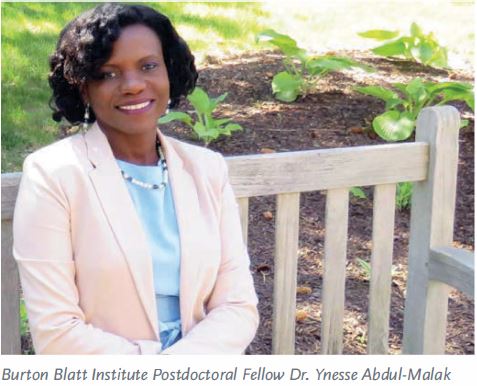August 13, 2018
Source: Syracuse Law Yearbook 2018

During 2017-2018, the College of Law’s Burton Blatt Institute (BBI) continued its important collaboration with the American Bar Association (ABA). BBI is directing a first-ofits-kind nationwide study with the ABA to examine challenges encountered by legal professionals, with an initial focus on lawyers with disabilities and lawyers who identify as LGBTQ+, to develop evidence-based strategies to reduce bias prejudice and increase opportunities in the profession.
“This research is commissioned by the ABA to identify factors that impede full and equal participation of underrepresented communities in the legal profession and to interrupt the biases they experience,” explains Project Director Dr. Ynesse Abdul-Malak, a BBI Postdoctoral Fellow.
The study and related survey are part of the ABA Pathway to the Profession Project, which grew from the ABA’s Diversity and Inclusion 360 Commission. The commission was charged with developing initiatives to “move the needle” with respect to diversity and inclusion in the legal profession. ABA President Linda Klein identifies the project as integral to the ABA’s efforts to promote the participation of all lawyers in the association and the legal profession as a whole.
The number of openly LGBTQ+ lawyers and lawyers identifying as disabled is growing. Participation in the profession ofLGBTQ+ lawyers has more than doubled over the past decade, according to the National Association for Law Placement, although members of this population are still more likely to be employed by public interest organizations than by law firms. On the other hand, those among the 2% of law graduates who self-identify as disabled are even less likely to be employed at all, compared to those identifying as LGBTQ+.
Abdul-Malak observes that biases that impede full and equal participation of minority status attorneys are often structural, as when disabled lawyers find that a firm lacks proper accommodations for their disabilities. But impediments also may be associated with organizational culture. The existence of cultural biases is one of the initial findings Abdul-Malak highlights in survey results that she and BBI Director Peter Blanck have shared with the New York State Academy of Trial Lawyers, and it is one of the project deliverables that will be made available in fall 2018.
“We are doing well with survey participation,” says Abdul-Malak. “There are more than 2,000 respondents, from all 50 states with strong participation from New York and California, and we’re focusing on participation in the Midwest states.” The anonymous survey is quantitative, but there are open-ended questions as well. “One of the poignant narratives highlighted from the open-ended questions is from a 50-something gay male attorney who had been practicing 26 years. He wrote about colleagues and others who made fun of his sexuality at a professional meeting where he was openly told ‘not to bring his gay male agenda.'”
Preliminary survey results indicate that bias against minority groups may be more prevalent than thought in the legal profession, even in light of widespread efforts in diversity and inclusion programs. Abdul-Malak says that more than onethird of initial respondents report experiencing some form of harassment, while about one in five respondents say they have witnessed bullying on the job.
The study also asks respondents to identify what works when it comes to diversity and inclusion programs. As Blanck explains, “Among the benefits of this research is that practicing lawyers themselves are helping us to understand organizational policies, practices, and cultures that lead to positive employment outcomes for all legal professions, and especially those with disabilities and who are LGBTQ+. BBl’s prior studies find that organizational cultures that benefit one group often benefit all employees.”
“When we ask ‘what works?’ survey respondents identify training programs, peer mentoring, and other strategies,” observes Abdul-Malak. “One goal is to pinpoint successful ways to mitigate bias and to help foster new toolkits for inclusion and diversity programs-which also include LGBTQ+ lawyers and those with disabilities-to promote their representation in the legal profession.”
Take the BBI/ABA Survey Here.